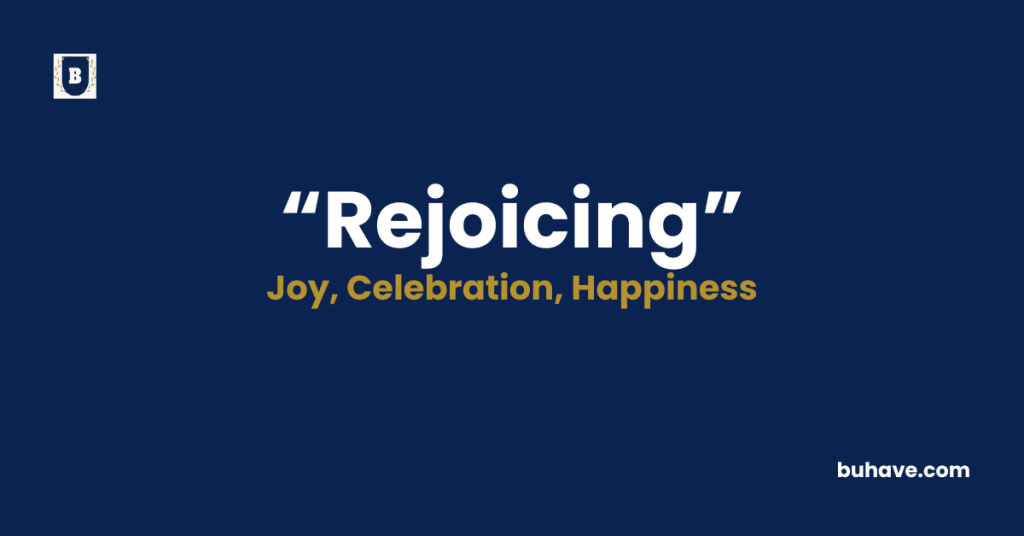The word ‘Rejoicing’ (Noun) refers to the expression of great joy, celebration, or happiness, usually in response to a positive event or outcome. In this guide, you’ll explore the full definition, detailed etymology, examples, synonyms, antonyms, and frequently asked questions about the word “Rejoicing” along with how to use it naturally in conversation or writing.
Rejoicing Explained in Depth
A complete and detailed guide to the words Rejoicing including meaning, definition, examples, etymology, synonyms, and antonyms.
Meanings of Rejoicing
Rejoicing means the act of showing or feeling great happiness and celebration, especially after something fortunate, victorious, or heartwarming occurs. It can be both internal (as in feeling joy deeply) or external (as in celebrating with laughter, music, dancing, or cheering). Rejoicing usually follows good news, milestones, reunions, or other uplifting moments. It brings out a strong emotional response that’s positive, often contagious, and shared in groups or communities.
While the verb form “rejoice” means “to be very happy,” “rejoicing” as a noun refers to the action or atmosphere surrounding that happiness. For instance, when a team wins a championship, the city might erupt in rejoicing. Similarly, in religious or ceremonial settings, rejoicing might be expressed through singing, praise, or communal festivities. It’s an emotion that connects people, uplifts spirits, and emphasizes gratitude and celebration.
Definition
Rejoicing refers to the deep feeling or open expression of great joy and happiness, especially during a moment of celebration or success. Rather than keeping emotions inside, people who are rejoicing often express their excitement through laughter, cheering, or happy tears.
For instance, when a long-awaited goal is finally achieved like graduating after years of hard work or reuniting with a loved one people don’t just feel glad; they actively show their joy in heartfelt ways. So, to rejoice means to go beyond being quietly happy and to celebrate that happiness out loud or with others, making the moment even more meaningful and shared.
Etymology
The word “rejoicing” originates from the verb “rejoice,” which comes from the Old French word rejoir, meaning “to enjoy” or “to be glad.” This, in turn, comes from the Latin root gaudere, meaning “to be joyful.” The prefix “re-” in Old French doesn’t mean “again” in this case but functions as an intensifier—so “rejoir” originally meant to feel joy intensely.
By the 13th century, “rejoice” entered Middle English, retaining the sense of outward expression of joy. The noun “rejoicing” later developed to describe the act or experience of that emotion itself. Historically, it has appeared in religious texts, poetry, and public speeches to emphasize gratitude, victory, or divine blessings. Over time, “rejoicing” has come to symbolize not just personal happiness, but collective joy and celebration across cultures and occasions.
Example Sentences
- The crowd erupted in rejoicing as the home team scored the winning goal.
- There was much rejoicing at the birth of the long-awaited child.
- The community gathered in rejoicing after the disaster relief arrived safely.
- Families were rejoicing during the holiday reunion after years apart.
- She couldn’t stop rejoicing when she received her university acceptance letter.
Rejoicing Synonyms
- Celebration
- Exultation
- Joy
- Elation
- Cheer
- Jubilation
- Happiness
- Glee
- Festivity
- Triumph
Rejoicing Antonyms
- Mourning
- Sorrow
- Grief
- Sadness
- Despair
- Melancholy
- Lamenting
- Regret
- Depression
- Disappointment
FAQs about Rejoicing
Here are some frequently asked questions (FAQs) about the word “Rejoicing”
1. What does “rejoicing” actually mean?
“Rejoicing” means expressing or feeling great happiness, usually in response to a joyful event or outcome. It can be both private (inner joy) or public (celebration with others).
2. Is “rejoicing” only used for major events?
No, while it’s often associated with big celebrations, it can also describe personal or small moments of joy—like hearing good news or spending time with loved ones.
3. Can “rejoicing” be used in a religious context?
Yes, very often. Many religious ceremonies include rejoicing as a form of praise, thanksgiving, or worship. It’s common in hymns, prayers, and spiritual celebrations.
4. Is “rejoicing” a formal word?
It’s more formal than everyday words like “happy” or “glad,” but still widely used in writing, speeches, and ceremonial contexts. In conversation, it adds a poetic or emphatic touch.
5. What’s the difference between “rejoicing” and “celebrating”?
“Celebrating” is often tied to events or rituals (like parties), while “rejoicing” focuses more on the emotional experience of joy, even without a formal occasion.

















